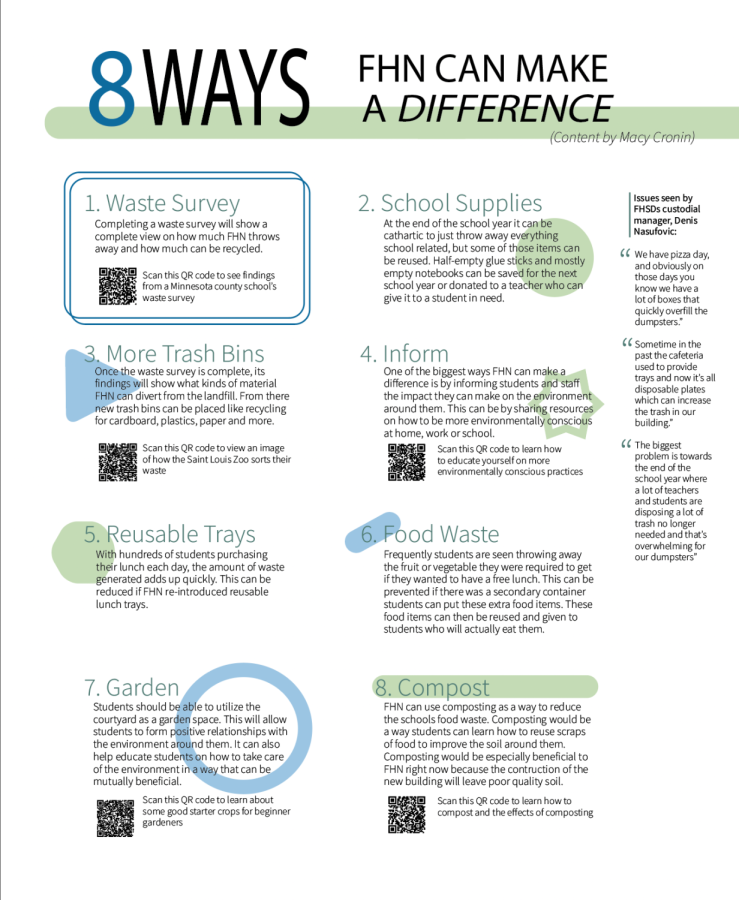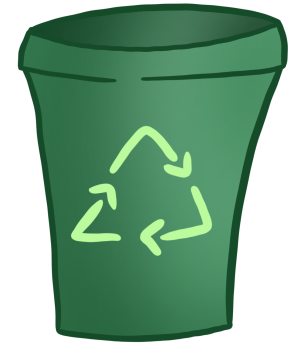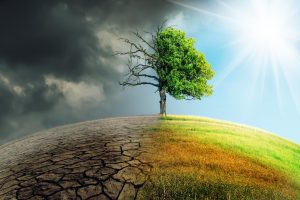Climate Change-Local
Published: March 16, 2022
What is Environmental Consciousness?
What is the first thing that everyone does when they wake up in the morning? Many may say something else but the true first thing is taking a breath of fresh, clean air. People often don’t realize how reliant they are on a clean environment and take for granted things like that. Unfortunately our environment is in a bad state and some of the things people do are just fuel to the fire. Fortunately, there is hope.
“The good news is that there are lots of things to do,” SLU professor Benjamin de Foy said. “Not everybody has to do everything but at the same time everybody has to do something.”
One of the problems with the environment is that there isn’t just one issue that can be pinpointed and fixed. There are many issues working together to slowly degrade the environment. Some of the biggest issues the world is facing are air pollution, climate change and water pollution. The combination of things like increased carbon emissions and greenhouse gasses in the atmosphere are causing natural disasters and weather extremes to become more prevalent. Picturing what the future looks like is not difficult as many of the future predictions that experts have made are coming true presently.
“I don’t want to paint too catastrophic of a picture but we are already seeing how in some communities and places around the world, they are experiencing the conditions we would expect to see in a few years,” Associate Professor in Earth Sciences at Lindenwood Ana Londono said.
Being environmentally conscious may seem like no easy task, but in reality all it comes down to are choices. People make choices everyday, whether it be what to have for breakfast or what song to listen to in the car. People also make choices like driving gas powered cars to work and keeping their heaters high in the winter. In some instances, choices like these are unavoidable and have to be made. However, there are choices that everyone can make to make a difference. By making those smart choices, people inherently become more environmentally conscious.
Using reusable bags, turning the lights off when you leave the house and running the dishwasher instead of hand washing dishes. These are all things that many do out of habit and are all things that contribute to the betterment of environment. In order to fully understand the scope of change that needs to happen, it is important to visualize it in a three tier system: personal actions, societal actions, and hopes for the future.
The personal actions are what each and every person can do and can be as small as eating healthier locally sourced food when applicable or as large as trading in one’s gas car for an electric car. Societal actions are what everyone can work to do and those are things that can be done collectively at a local or national level. These are things like speaking with local legislators or working to get involved in an environmental organization. Finally, one has to look at their hopes for the future, and see if those actions are in agreement with caring for the earth. If those things aren’t, then one must work to think what kind of things they can do to maybe make those hopes in agreement with caring for the earth. All of these actions build off each other, but most importantly it starts with the individual and what they can be doing to start the chain of change.
“I’m not expecting everybody to become vegan overnight,” de Foy said. “But we could eat healthier, we could eat better food, we could save money and we could reduce our carbon footprint all in one go.”
The big question that may be laying heavily on some people’s mind is “what does the future look like?” One of the biggest issues that many face today is the negativity surrounding the environmental crisis. Many are led to believe that our environment has been messed up to the point of no return. Many people see the advertisements about the melting poles and the polar bears whose homes have been stripped away from them. According to de Foy “polar bears have become the poster child of climate change” and many fall into the trap of believing that the world is hopeless. While this is a harsh reality now, it is not necessarily what the future will look like. The changes people make now directly influence the future. There is always a chance and there will always be ways people can work to help the environment. By doing those things, the future of our environment will only look more and more bright.
“Your generation and younger suffer from all the stress of what our future will be and it’s very sad to see the youth feeling hopeless,” Londono said. “We should think about it in a positive way. There is still a chance but change starts with us. If everyone does a little bit, the collective does a lot.” (Story by Justin Brewer)
 Education on Climate Change
Education on Climate Change

A core class in school, the sciences are an imperative piece of education that students often overlook, especially when it comes to environmental sciences. Many see this and other similar classes as lesser than its counterparts like chemistry or physics. But like those classes, environmental classes can be important to better understand our changing environment. These classes will teach students ways they can help protect our environment and how they are leaving their mark on our ever-changing world.
At North, environmental science and biology are two classes that teach students about our environment. Environmental science focuses on ways that humans affect the environment and ways to help prevent the pollution of our earth. Biology focuses on the study of life and touches on the subject of our environment. Larry Scheller has been teaching biology at North for 17 years and finds the subject of environmental science to be important in his curriculum for decision making.
“I do think that learning about the environment is important because it’s something that [students] can see and will experience in their lives,” Scheller said. “They’re gonna need to know it to make important decisions as a society in the future. I think a lot of times people go into voting not actually having the knowledge they need in order to make a proper decision. So I think it’s important that they know what they’re talking about.”
Being knowledgeable about the issues surrounding our environment is important in making more informed decisions. As students moving through high school reach the voting age, information learned from environmental science classes will become critical in making educated decisions that are environmentally friendly.
As for students not yet able to vote, being knowledgeable about the problems facing our environment is important to being more environmentally conscious in the future. Sean Ireland is a junior taking environmental science taught by Joe Brocksmith. Through the class, Ireland has learned several ways in which he helps to better protect the environment.
“Personally, what I try to do is pick up things on the side of the road that I see,” Ireland said. “And I try to recycle things, If it’s a plastic bottle, for example, I’ll put it into recycling instead of just throwing it into the trash.”
Not only are students concerned with the environment, teachers around the building are passionate about helping to protect the environment. Before the COVID-19 pandemic, Yvonne Kehoe, a special education English teacher at North, was head of the recycle club; an after school program which helped promote recycling around North.
“We picked up recycling, which were blue bags, so each teacher that wanted to participate, we gave them some blue bags, and that was through the city of St. Peters,” Kehoe said. “And about once a week, we went around after school recycling all that to ensure that it got into the proper recycling bin.”
Unfortunately, due to COVID, the club was shut down and has not made a return to North. Despite this, Kehoe and other students around the school remain passionate in protecting our environment. Through clubs like the Sun Club or Ecology club, the legacy of the recycle club carries on. And without classes like environmental science, students may not be able to learn about the damage being done to our environment.
“I think that [students] need to be aware that they, their children, their grandchildren, all need to share this one Earth,” Kehoe said. “I hope that they see value in saving the Earth and that they will pass it on to their family members and friends.” (Story by Mckenna Hudson)
North’s Impact on the Environment

The school has changed drastically over the last two years. With the new head principal coming to FHN next year, it is important to see how the school is currently impacting the environment to understand some of the many changes the new principal aspires to bring to FHN. Unfortunately for FHN, many of the environmental activities have been severely hindered by COVID-19.
“Some of these things have been quite affected by COVID,” Assistant Principal Jeff Blankenship said. “It just interrupted some of the things that have been done.”
A very important position affected heavily by COVID-19, are the custodians at FHN. Because of how rampant the virus has been, many people are unwilling to work as sanitation workers. This has massively impacted our current custodians by forcing them to balance between keeping the school maintained and limiting the school’s impact on the environment. Administrative Assistant Stephanie Slaughter expresses how difficult it is for the custodians.
“We are very low on custodians,” Slaughter said. “I know some evenings it is difficult for them to get the building cleaned. Adding one more thing to their plate would be very difficult for them.”
There are only three main custodians. With 1750 students and staff members at FHN, the custodians cannot do everything everyday. However, this is not the only factor currently restricting the school’s ability to help the environment. Head Principal Dr. Lucas Lammers elaborates on how important the new building can be when it comes to conserving energy.
“It’s an old building,” Lammers said. “Old buildings are inefficient when it comes to heat. The new building should be far more efficient when it is built. That’s one of the many, many reasons we needed a new building, is to have more efficiencies built in.”
The building currently has issues with vents and A/C constantly breaking. With how old the infrastructure is, the efficiency of the ventilation system has deteriorated. This requires the school to use more energy to keep it maintained, skyrocketing our carbon footprint. However, this problem will linger until the new building is completed. Previously, FHN had various clubs that worked to alleviate the school’s carbon footprint. These were clubs like the gardening club and recycling club made specifically for students to help the environment at FHN. These clubs were run by Yvonne Kehoe, an English teacher for the special education department.
“The Gardening Club kind of started an extracurricular activity,” Kehoe said. “We wanted to invite all departments to understand something about the agriculture in the area and participate in any way they could.”
Like the gardening club, the recycling club created a community around the school. Mainly with staff and teachers, blue recycling bags were placed around the building for students to collect and recycle. However, this project was postponed indefinitely.
“It was COVID,” Kehoe said. “Even though the students wore gloves every time they collected the blue bags, I still didn’t want them exposed to whatever germs might be on the recycled materials.”
That being said, if a group of students is willing to continue these clubs or have other ideas to help the environment, they always have the opportunity to create a club.
“People can start a club for any reason,” Blankenship said. “Anytime we have a group of students interested in anything, and they can’t find a sponsor, they go through the activities office and ask for what they need.”
The incoming Head Principal Jeffrey Fletcher believes in allowing students more freedom with the activities they wish to pursue and some of his plans involve the reuse of materials.
“Starting that club back up would be awesome,” Fletcher said. “I think being very conscious of making sure we’re using the materials we’re purchasing or are given to us, and reusing them and not just throwing them away.”
Fletcher is very conscious about making sure the school usage of paper is drastically reduced.
“There’s a lot of technological things that we can do,” Fletcher said. “Something I try to be very conscious about when I’m leading meetings or sending out information to students, parents, and teachers, something I would do personally is sending more of these things out electronically instead of making flyers or posters about it.”
Although the school’s capabilities to stay environmentally conscious were hindered due to COVID-19 and the building’s age, Fletcher hopes to cushion that impact and bring a new environment overall to FHN. (Story by Peter Pae)
The Dawn of Sun Club

The idea for Sun Club started in October of this school year after sophomore Hailey Zhang saw that the school’s recycling went nowhere and the school didn’t have many environmentally-friendly plans in place. She planned, found support and asked a teacher to sponsor the club she had envisioned in her mind.
“I really wanted to create a club at our school to really give people the opportunity to do something about [the climate crisis] because a lot of times, the problem is way too big for us and we feel very overwhelmed by it,” Zhang said. “We feel like we are helpless against it. And I created the club because I felt like students needed a way to, little by little, bring change to that global crisis we’re facing.”
After Zhang came up with the idea for this club that she believed the school needed, she reached out to her friend and fellow sophomore Claire Laurentius. Laurentius had experience with the agricultural aspect of environmental activism and Zhang wanted her input while coming up with a plan for this new club.
“Claire’s family owns farms and stuff,” Zhang said. “So she knows a lot about agriculture and gardening and things like that. She helps with a lot of things. I got my friends to help me with different things.”
After Zhang and Laurentius created their plan, they had to find a teacher to sponsor the club. French teacher Jenny Liberson was Zhang’s choice for who she wanted to be the sponsor for the club.
“I know a lot of teachers care about the environment, but I felt like she was the most approachable in the sense because I knew that she cared about the environment a lot and I knew that she did a lot of gardening at home,” Zhang said. “So I thought she would be the perfect teacher to help us with all the things we do and plus she gives us a lot of freedom. She doesn’t control the club at all. The club is really just a student run. And she understands that and I think that’s why I chose her because she’s a really understanding teacher.”
Currently, Sun Club is split into four committees that each have their own major projects that they are working on. The Climate Talks committee aims to reach out to the younger generations by speaking to elementary schools in our district. The Sunrise committee is working on the national movement called the Sunrise Movement, which is a youth movement that aims to make change through legislation. The Volunteering and Fundraising committee works to create volunteer opportunities for those who are interested. The last committee is the Garden committee who works to create gardens in our community and bring back the one we have in our school to use for composting.
“One committee has to do with talking to kids, the elementary schools, about the environment,” Liberson said. “Another one has to do with the Sunrise Movement, which is a nationwide thing. Another one has to do with creating a garden and composting in our school and recycling. And then another one, their goal is to create a farmers market that we can have at our school.”
While Sun Club is a new club and just starting out with their progress toward change, Zhang and Liberson are hopeful that Sun Club will be very successful in the future. They hope that they can help set FHN on the right track to be more environmentally conscious.
“I hope we make change and I hope that change is a lasting change,” Zhang said. “I really hope that people will see the change, and they feel inspired to also make more change. In the future, I just really hope sun club will be a place in which we all are working towards a common goal and really just make change.”









![JV Girls Basketball Takes A Win To FZE On The First Game Of The Season [Photo Gallery]](https://FHNtoday.com/wp-content/uploads/2024/12/voccer10.24_kwallace-3-300x200.jpg)

![It's Time for the BOE to Respect Student Input [Editorial]](https://FHNtoday.com/wp-content/uploads/2024/11/Untitled_Artwork-1-300x173.png)


